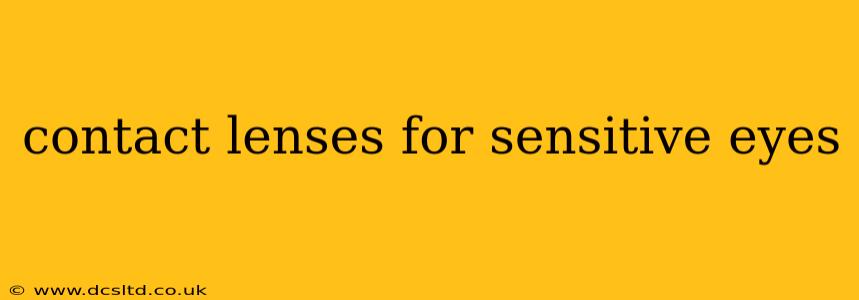Millions of people rely on contact lenses for clear vision, but if you have sensitive eyes, finding the right pair can feel like searching for a needle in a haystack. Redness, irritation, dryness, and discomfort are common complaints for those with sensitive eyes. This comprehensive guide will walk you through everything you need to know about choosing the most comfortable and suitable contact lenses for your needs. We'll delve into different lens materials, solutions, and other factors to consider for happy, healthy eyes.
What Makes Eyes Sensitive?
Before we dive into lens types, understanding why your eyes are sensitive is crucial. Several factors can contribute to eye sensitivity:
- Dry Eye Syndrome: This prevalent condition involves insufficient tear production or tear evaporation, leading to dryness, itching, and burning.
- Allergies: Seasonal allergies or reactions to specific substances can cause significant eye irritation and inflammation.
- Blepharitis: Inflammation of the eyelids can lead to dryness and sensitivity.
- Certain Medications: Some medications have side effects that can affect tear production and eye health.
- Environmental Factors: Wind, sun, smoke, and pollutants can all irritate sensitive eyes.
Understanding the root cause of your sensitivity will help you choose the most appropriate contact lenses and care regimen.
What Types of Contact Lenses are Best for Sensitive Eyes?
Not all contact lenses are created equal. The material a lens is made from plays a significant role in comfort and eye health. Here are some top contenders for sensitive eyes:
1. Hydrogel Lenses:
These lenses are generally more breathable than silicone hydrogel lenses, making them a good choice for those prone to dryness. They are often more affordable than silicone hydrogels, but they may not provide the same level of oxygen permeability.
2. Silicone Hydrogel Lenses:
These lenses offer superior oxygen permeability compared to hydrogel lenses. This high oxygen transmissibility helps keep your corneas healthy and reduces the risk of hypoxia (lack of oxygen), a common cause of discomfort in contact lens wearers. They are generally more expensive than hydrogel lenses. Look for lenses with high Dk/t values (a measure of oxygen permeability).
3. Daily Disposable Lenses:
Daily disposables eliminate the need for cleaning and disinfecting, minimizing the risk of irritation from lens solutions or bacteria buildup. This is often the preferred option for sensitive eyes. The fresh lens each day reduces the chance of accumulating irritants.
4. Multifocal Lenses:
If you need correction for presbyopia (age-related near vision loss), multifocal lenses are an option. However, finding comfortable multifocal lenses for sensitive eyes may require some trial and error. Be sure to discuss your sensitivity with your eye doctor to find the best option.
What Contact Lens Solutions are Best for Sensitive Eyes?
The solution you use to clean and store your lenses is just as important as the lenses themselves. Some solutions are gentler on sensitive eyes than others:
- Lubricated Solutions: Solutions with added lubricants can help keep your eyes moist and comfortable.
- Hypoallergenic Solutions: These solutions are formulated to minimize the risk of allergic reactions.
- Hydrogen Peroxide Solutions: These are generally less irritating than other solutions, but require a special rinsing process.
Always consult your eye doctor to determine the best solution for your specific needs.
How Often Should I Replace My Contact Lenses?
Following your eye doctor's recommendations for replacement schedules is critical for maintaining eye health. Replacing lenses according to schedule helps prevent infection and irritation. Daily disposables are a good choice for sensitive eyes, as they offer a fresh lens every day.
What if My Eyes Still Feel Irritated?
If you experience persistent irritation, redness, or discomfort, remove your lenses immediately and consult your eye doctor. They can determine the cause of the irritation and recommend appropriate treatment.
Can I Use Lubricating Eye Drops with Contact Lenses?
Yes, many lubricating eye drops are compatible with contact lenses. Always check the label to ensure the drops are safe for contact lens wearers and follow the instructions carefully.
What are the signs I need to see an eye doctor immediately?
Severe eye pain, blurred vision, excessive redness, or discharge are all signs you need to see your eye doctor immediately. Don't delay seeking professional help if you experience any of these symptoms.
This guide provides a starting point for finding contact lenses suitable for sensitive eyes. Remember that individual needs vary, and consulting with your eye care professional is essential for personalized advice and the safest, most comfortable contact lens experience. They can help you determine the best lens type, solution, and care regimen for your unique circumstances.
